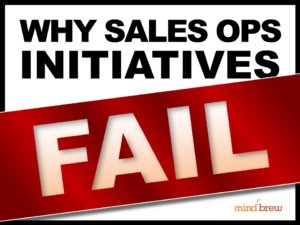A lot of advice from self-proclaimed “business gurus” will tell you to focus on potential positive outcomes. Chase after your dreams, they say. Focus on the positive. Don’t let fear of failure hold you back.
That type of advice definitely has its place, but when it comes to the practicalities of implementing a Sales Ops project, thinking about potential failure can actually be helpful.
No, we don’t want you to overthink things to the point where you can’t take any action. And no, we don’t want you to become stressed out or not enjoy your job.
But we also don’t want you to get so caught up in the excitement of how things could go right that you fail to notice if things are starting to go wrong.
If you consider risks upfront, it’s much easier to guard against them. It can also make it easier to see if you’ve fallen into a common trap.
From our vantage point as outside observers, we’ve seen that many Sales Ops teams get tripped up in similar ways. Here are three mistakes that we see a lot:
- Expecting people to adopt entirely new business processes instead of aligning to existing patterns. People don’t like change. You’ll get much better results if you deliver improvements directly to them than if you expect them to change ingrained behavior. For example, if you’re wanting to highlight cross- or up-sell opportunities for a salesperson’s target accounts, don’t ask them to log into a new tool. Instead, find a way to highlight those opportunities in the tools they already use and are familiar with–even if it’s as simple as sending them emails.
- Letting the quest for perfection or technical elegance slow things down or get in the way of actual progress. Making small, incremental improvements over time is generally more successful than implementing a wholesale change. And it’s far more important that you achieve the results you want than that you implement best practices. It’s sort of like trying to eat a healthier diet. Sure, it might be best if you ate only organic vegetables. But if organic produce isn’t available, it’s still better to have a non-organic apple for lunch than to keep eating the greasy cheeseburgers you usually eat. In the same way, go ahead and adopt sales improvements that are slightly better than what you have today even if they aren’t completely perfect.
- Expecting others in the organization to slice and dice data themselves instead of giving them the answers they’re looking for. As Sales Ops professionals, we tend to be numbers people. It’s easy for us to extrapolate lessons from raw data. And we enjoy getting into the details and looking for new insights. Your sales team almost certainly does not have these same personality traits. Don’t give them an analytics tool — that will not have the effect you are hoping for. Instead, give them direct, actionable information that lets them know exactly what they should do.
These are only three of the common points of failure we see in Sales Ops projects. We cover many others in the webinar Why Sales Ops Initiatives Fail. It’s full of helpful advice that can help you avoid common pitfalls.
As you roll out your next project, pause every now and then to consider whether you are starting to fall into one of these traps. It can save you time and heartache in the long run.











